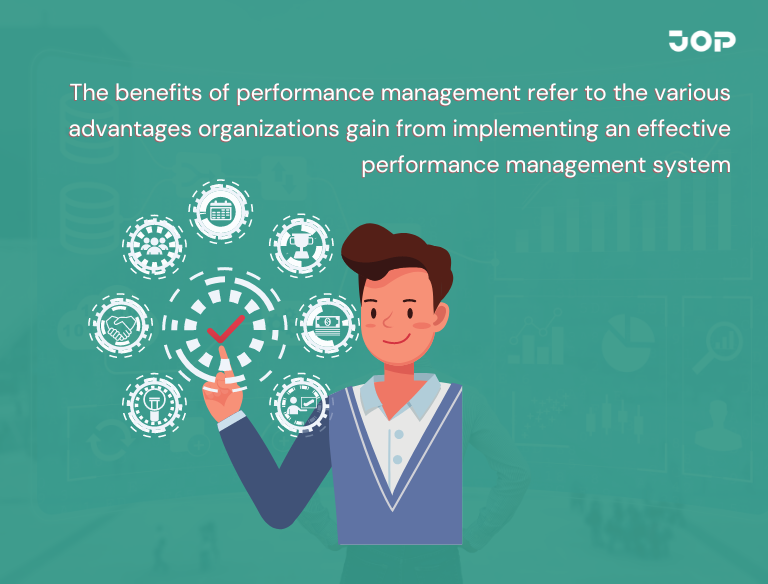Ever felt like managing your team’s performance is like steering a ship without a compass? Without the benefits of a performance management system, it’s like solving a puzzle without all the pieces.
The right performance management system brings clarity, structure, and efficiency to your workplace, making it easier to drive success. Imagine a system that enhances employee engagement, streamlines communication, and elevates organizational performance.
In this blog, we’ll explore the real-world benefits of a performance management system and share actionable insights for success.

What is the concept of benefits of performance management?
The benefits of performance management refer to the various advantages and improvements that organizations and employees gain from implementing an effective performance management system.
These benefits may include improved communication, increased employee motivation and engagement, better accountability, identification of development opportunities, fair and transparent decision-making, improved retention, enhanced productivity, competitive advantage, and strategic alignment. By leveraging these benefits, organizations can optimize their human capital, drive business success, and achieve long-term growth.
11 most important benefits of performance management
1. Sets and tracks clear goals
You know, one of the real gems of a performance management system is how it sets and tracks goals. It’s like having a personal coach for each team member. Here’s the deal: It’s not just about saying, “Hey, here are your goals,” and leaving it there. With these systems, you can set specific, measurable, achievable, relevant, and time-bound (SMART) goals, which are like the secret sauce for success.
Example: Now, let me paint a picture for you. Imagine you’re managing a project team in a marketing agency. Without this system, it’s a bit like everyone’s wandering in the dark. There are no clear milestones, and no one knows if they’re on track or not.
But then, you introduce the performance management system, and suddenly, it’s like a light turns on. You set SMART goals for each team member. They know exactly what’s expected and when it needs to be done. Plus, the system allows you to track progress effortlessly. So, you’re not just setting goals; you’re keeping tabs on them too.
This has a massive impact. It boosts focus and motivation because everyone can see how their efforts are contributing to the bigger picture. It’s like a roadmap to success, and that clarity can drive some serious performance gains.
2. Provides clarity in goals and expectations
You know, one of the coolest things about performance management systems is that they make everything super clear for your team. It’s like giving them a GPS for their work. When your folks know exactly what’s expected, it’s a game-changer for their performance.
Example: Imagine you’re heading up a sales team at a software company. Before implementing a this system, the goals were a bit fuzzy. Some sales folks were all about new customers, while others were focused on keeping the existing ones happy. It was a bit of a mess, to be honest.
Now, picture this: you bring in a performance management system. You set specific sales targets for each team member, provide regular feedback, and tie their goals to the company’s overall revenue goals. Suddenly, it’s like everyone’s on the same page. They know exactly what’s expected, and that sharpens their focus, encourages friendly competition, and boom – sales performance goes up.
3. Enhances work efficiency
Another great thing about performance management systems is that they help your team work smarter. Here’s how: They spot areas where your folks can improve and give them helpful feedback.
Think of it like this: When you have regular performance check-ins, your team gets a chance to see where they’re falling short and where they’re shining. Over time, this helps them get better at what they do, which naturally cranks up their work efficiency.
Example: Imagine you’re running a manufacturing plant, and quality control issues keep popping up. Earlier, those issues kept slipping through the cracks. It was a mess – wasted materials and production delays galore because employees weren’t getting the feedback they needed.
Now, fast forward to the performance management system era. You start doing regular quality checks and performance reviews. If something’s not up to snuff, employees get Performance Management Feedback right away, plus the training and support to fix it. Over time, they become pros at maintaining quality standards, which means less waste, faster production, and supercharged work efficiency.
4. Uncovers possible vulnerabilities
You can spot red flags like underperformance, skill gaps, or process issues before they escalate by regularly assessing employee performance. This allows you to provide timely support, training, or process improvements.
Additionally, analyzing performance data helps anticipate future resource needs, preventing shortages or overspending. Essentially, it’s a proactive way to identify and address risks to your business.
Example: let’s say a sales team consistently misses its quarterly targets. Through performance management, you might uncover that they lack product knowledge.
This indicates a potential risk of decreased sales and revenue. By addressing this knowledge gap through training, you can mitigate the risk and improve overall performance.
5. Boosts employee morale and engagement
Now, let’s talk about boosting morale and engagement. This is where performance management systems truly shine. Think of them as your secret sauce for a happy and motivated team.
Here’s why: When employees know their efforts are recognized and valued, they’re more likely to be engaged and give their best. Performance management systems allow you to give regular feedback and recognition, and they make it easy to celebrate wins and milestones. It’s like throwing a mini-party every time someone does something great.
Example: You’re managing a customer service team. Without a this system, it’s easy for your folks to feel like their hard work goes unnoticed. But when you implement the system, you can acknowledge their achievements regularly. Maybe someone resolved a particularly tricky customer issue – you can give them a virtual high-five right there in the system. That recognition goes a long way in boosting their morale and Employee Productivity.
Plus, these systems often have tools for setting development plans and career paths. When employees see that the organization is invested in their growth, it’s a serious morale booster. They feel like they’re part of something bigger, and that’s a powerful driver for engagement.
6. Identifies training needs
Now, let’s talk about how performance management systems can be your secret weapon for identifying training needs. It’s like having a personal coach who knows exactly where you need to improve.
Here’s the deal: These systems don’t just track performance; they also help you pinpoint where your team members might need a little extra training or support. It’s like having a spotlight on areas where they can grow.
Example: Imagine you’re managing an IT department. Without a this system, it can be tricky to figure out who needs what kind of training. But when you introduce the system, it starts tracking individual performance metrics. You might notice that some team members consistently struggle with certain software or skills while others excel.
That’s where the magic happens. The system helps you spot these trends and identify specific training needs. Maybe it’s a technical workshop for some or leadership training for others. By addressing these needs, you’re not only boosting individual skills but also elevating the team’s overall performance.
7. Defines career paths
Now, let’s talk about how performance management systems can be your career GPS. They’re not just about the here and now; they’re also about shaping the future.
Here’s how: These systems often have tools for defining career paths within your organization. It’s like offering your team members a roadmap for their professional journey.
Example: Imagine you’re managing a group of designers in a creative agency. Without a performance management system, it can be a bit vague for your team to see where their career might lead within the company. But when you introduce the system, you can create clear career paths. You can lay out the specific steps to move from a junior designer to a senior one or from a graphic designer to a creative director.
This clarity is a game-changer. It shows your team that their growth and development matter to the organization. It’s not just about their current role; it’s about where they can go from here. That kind of vision can be seriously motivating, and it keeps your team engaged for the long haul.
8. Provides documentation for personnel decisions
One valuable aspect of performance management systems is how they help you keep your HR records in shape. It’s like having a digital filing cabinet for all your personnel decisions, and it can be a lifesaver.
Here’s the scoop: These systems are not just about tracking performance; they’re also about documenting everything related to your team members. Think of it as your organizational memory bank.
Example: Imagine you’re managing a bustling marketing team. Without this system, it can be a real headache to keep track of everything – who got a promotion, who had a performance issue, who received recognition, and so on. But when you introduce the system, every personnel decision, no matter how big or small, gets documented.
Now, picture this: a year down the line, you’re having a discussion about promotions. You need to show who’s been consistently outstanding and who’s been working hard. Thanks to the performance management system, you can easily pull up data and documentation to support your decisions. It’s not a he-said-she-said situation; it’s all there in black and white. This makes personnel decisions fair, transparent, and well-informed.
9. Promotes job satisfaction
Now, let’s chat about how performance management systems can be a secret ingredient for boosting job satisfaction. It’s like adding a sprinkle of happiness to your workplace.
Here’s why: These systems don’t just track numbers; they also foster a culture of feedback and recognition. When employees feel appreciated and heard, they’re more likely to enjoy their jobs.
Example: Imagine you’re managing a customer support team. Without this system, it can be tough to gauge how your team feels about their work. But when you introduce the system, it encourages regular feedback and recognition. It’s like turning your workplace into a positive feedback loop.
Now, think of this in action: one of your support agents goes above and beyond to help a customer. Thanks to the system, you can give them a virtual pat on the back right away. This boosts their morale and job satisfaction. Plus, when they receive constructive feedback to improve, they feel like they’re growing in their role, which adds to their satisfaction.
What’s more, these systems often have tools for setting goals and career development plans. When employees see a clear path for growth within the company, it makes them excited about their future there. That kind of job satisfaction is contagious and creates a positive work environment.
10. Increases talent retention
Now, let’s chat about how performance management systems can be your secret weapon for keeping your top talents on board. Think of it as the glue that helps hold your dream team together.
Here’s the scoop: These systems don’t just track performance; they also nurture your employees’ growth and development. When your team members see a clear path for advancement and feel their efforts are recognized, they’re more likely to stick around.
Example: Imagine you’re managing a tech startup. Without this system, it can be tough to show your rockstar developers that they have a future at your company. But when you introduce the system, you can set up career development plans that map out their journey from junior to senior developer.
Picture this: one of your top developers has been with you for a few years and is doing stellar work. With the performance management system, you can offer them a clear path to becoming a lead developer or even a tech lead. They see that their growth matters to the company, and that’s a big incentive to stay put.
Moreover, these systems often provide a space for continuous feedback and recognition. When employees feel valued and supported, they’re less likely to look elsewhere for opportunities. It’s like creating a strong sense of belonging and purpose of Performance Management within your organization.
11. Improves organizational impacts
Now, let’s discuss how performance management systems can supercharge your organization’s overall impact. It’s not just about individual growth; it’s about making a bigger dent in the universe.
Here’s why these systems are game-changers: They help align individual goals with the organization’s strategic objectives. It’s like having everyone rowing in the same direction toward a common goal.
Example: Imagine you’re running a nonprofit focused on environmental conservation. Without this system, it’s tricky to ensure that every team member’s efforts contribute to the larger mission. But when you introduce the system, you can set individual goals that directly link to the organization’s sustainability targets.
Now, picture this in action: your marketing team’s efforts to raise awareness about conservation directly support your nonprofit’s mission. With the performance management system, you can track progress toward those goals in real-time. This alignment of individual and organizational objectives amplifies your impact.
Moreover, these systems often offer data analytics and reporting tools. You can easily measure how your team’s performance is contributing to the bigger picture. This data-driven approach helps you make informed decisions and tweak strategies for maximum effectiveness.
Conclusion
JOP (Joy of Performing) states that a well-implemented performance management system is an investment in your employees and your business. It drives results, boosts morale, and ensures your organization is equipped to meet future challenges. If you’re looking to optimize your performance management process or need guidance, consider partnering with our performance management consultant. They can provide expert advice, tailored solutions, and support to help you achieve your goals. Click Here
Frequently Asked Questions
1. What are the 5 elements of a performance management system?
The 5 elements of a performance management system are:
- Setting clear goals
- Regular feedback
- Performance evaluation
- Employee development
- Rewards and recognition
2. What are the benefits of performance management system?
Performance management boosts employee performance, engagement, and retention while aligning goals, improving decision-making, and fostering a growth-oriented culture.
3. What is the impact of the performance management system?
Performance management improves overall organizational performance by aligning goals, enhancing employee development, boosting employee engagement, and aiding in strategic decision-making.
4. What are the four purposes of a performance management system?
Performance management aims to set clear goals, provide regular feedback, assess performance, develop employees, and link performance to rewards.

Gaurav Sabharwal
CEO of JOP
Gaurav is the CEO of JOP (Joy of Performing), an OKR and high-performance enabling platform. With almost two decades of experience in building businesses, he knows what it takes to enable high performance within a team and engage them in the business. He supports organizations globally by becoming their growth partner and helping them build high-performing teams by tackling issues like lack of focus, unclear goals, unaligned teams, lack of funding, no continuous improvement framework, etc. He is a Certified OKR Coach and loves to share helpful resources and address common organizational challenges to help drive team performance. Read More
 Gaurav Sabharwal
Gaurav Sabharwal
